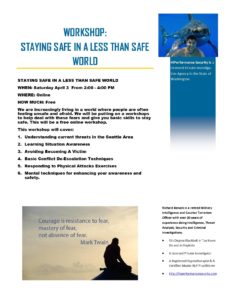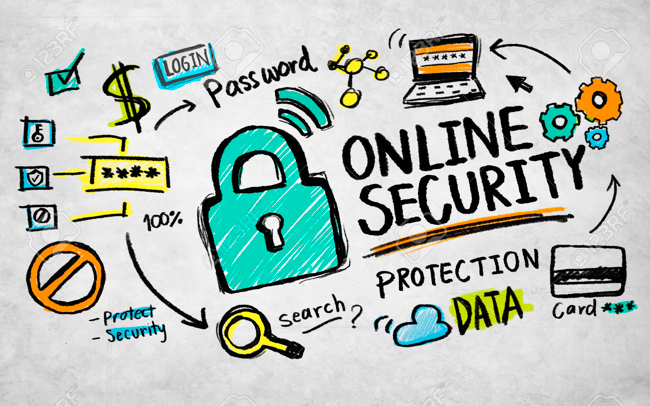Welcome to the HiPerformance Security blog. This week we will talk about an upcoming HiPerformance Security Sponsored Workshop
WORKSHOP: STAYING SAFE IN A LESS THAN SAFE WORLD

HiPerformance Security will be putting on a Zoom online workshop: STAYING SAFE IN A LESS THAN SAFE WORLD on Saturday April 3 From 2:00 – 4:00 PM
We are increasingly living in a world where people often feel unsafe and afraid even in there own towns. We will be putting on an online workshop to help deal with these concerns and give you some basic skills to stay safer.
This workshop will cover:
1) Understanding crime in Washington.
2) Learning Situation Awareness
3) Avoiding Becoming A Victim
4) Basic Conflict De-Escalation Techniques
5) Responding to Physical Attacks
The first step in being safer is “Situational Awareness”. Situational Awareness allows rapid, decisive action in dangerous situations regardless of whether our conscious is aware of them. To put it simply, it can be defined as “paying attention to your surroundings”. in situational awareness, when your subconscious or “gut” makes a strong recommendation on what to do, you should always give it serious consideration. If you feel unsafe walking down a street or getting into an elevator with a stranger late at night then listen to your instinct and change your actions.
Predator’s are always looking for potential victims. They often reads peoples body language as well as verbal & non-verbal behaviors. So the goal is to make yourself unattractive to these predators because they are looking for victims, not challenges.
One of the best ways to deal with potential threats is using conflict de-escalation. Conflict de-escalation is intended to prevent escalation of conflicts and differences into potential violence. This can be done in several ways:
Building rapport with a potential threat is one of the most important ways of avoiding escalation of tense situations and reducing the likelihood of violence. One of the most effective ways of building rapport is merely by listening to the other person. Listening is a powerful tool. When other people think that you have not listened to their concerns, they will often see you as a threat. Merely repeating back what person said can reduce tensions in a situation: “So what I hear you saying is that you believe…….. “
Controlling your voice tone and body language is another powerful de-escalation tool. A significant portion of the message people receive from you in face-to-face situations is conveyed through your body language and your voice tone. If you look threatening, you are threatening. If you want to de-escalate a conflict, remember to control your voice tone and body-language.
If you ever need to change something you said to avoid a misunderstanding, you can use “reframing“. Reframing allows you to restate (or even completely change) what you had previously said: “Let me reframe what I just said….
Finally, if a physical attack is unavoidable, you should focus on surviving the attack and escaping as soon as possible. Staying safe during an attack is not about “winning” a fight but protecting yourself and removing yourself from danger so that you can report this crime to the police.
For more information on keeping yourself safer, please attend our Workshop.
https://hiperformsecurity.blogspot.com/2021/01/welcome-to-hiperformance-security-blog.html
BLOG: STAYING SAFE ONLINE DURING THE HOLIDAYS

During this pandemic, people will be shopping more online and spending more time there then in the past. They will also be using their mobile devices extensively. Its even more important now that people practice online safety.
How Do Criminals Target Online Shoppers?
There are several common ways that criminals can attack online shoppers:
- They create fraudulent sites and send malicious email messages – Criminals can create malicious websites or email messages that appear to be legitimate. They may also misrepresent themselves as charities, especially after natural disasters or during holiday seasons. Criminals create these malicious sites and email messages to steal your personal and financial information.
- Targeting vulnerable computers – If you do not take steps to protect your computer, criminals may be able to install viruses and gain access to your computer.
Below are simple ways to better protect yourself and avoid becoming a victim of online fraud and identity theft:
- Avoid free Wi-Fi networks: Though convenient, free Wi-Fi networks , such as in some airports, hotels, train stations or cafés, are often used by cybercriminals to steal your online accounts and personal information. Before connecting to a free network, check the name of the network and the login procedures with the staff to confirm that the network is legitimate. Never conduct sensitive activities, such as online shopping, banking, or sensitive work from a public wireless network. You should always assume any “free” Wi-Fi in an airport is very high risk.
- Lock down your accounts:
- Establish a strong separate password for each online shopping account. Always use more than ten total characters consisting of upper-case letters, lower case letters, numbers, and special characters to create a strong password.
- Use different passwords on each of your online accounts. If one retailer is hacked and your credentials are leaked, having the same password between accounts makes it quick and easy for criminals to access other accounts. If you have trouble remembering all your unique passwords, consider using a pattern for your password or using a password manager.
- Buy safely online:
- Only do business with reputable vendors – Before providing any personal or financial information, make sure that you are interacting with a reputable, established vendor. Some criminals may try to trick you by creating malicious websites that appear to be legitimate, so you should verify the legitimacy before supplying any information.
- Use a credit card instead of debit cards – There are laws to limit your liability for fraudulent credit card charges, but you may not have the same protection for your debit cards. Also, debit cards draw money directly from bank accounts so unauthorized withdrawals could be charged to your bank account. You can minimize risk by using a single, low-limit credit card for all of your online purchases.
- When ordering online, check out as a guest to avoid saving payment information online. The inconvenience of having to enter your credit card information each time keeps you safer because a data breach at a retailer will not expose your financial information. It also means your payment information is not saved or can be used by anyone who gets access to your account.
- Check your credit card statements – Keep a record of your online purchases and copies of confirmation pages and compare them to your bank statements. If there is a discrepancy, report it immediately to your credit card company.
- Make sure your information is being encrypted. When passing sensitive information to a website, ensure the information will be encrypted. Look for a URL that begins with “https:” instead of “http:” and a padlock icon. If the padlock is closed, the information is encrypted.

____________________________________________________________________________
- Be careful of unknown emails
- Be very cautious of emails requesting information – Criminals may attempt to gather information by sending emails requesting that you confirm purchase or account information (called Phishing). Legitimate businesses will not solicit this type of information through email. If you receive an unsolicited email from a business, don’t clicking on the provided link. Instead, directly log on to the authentic website by typing the address yourself or look the website up on Google or Bing.
- Most of us receive emails from retailers about special offers during the holidays. Cyber criminals will often send phishing emails—designed to look like they’re from retailers—that have malicious links or that ask for you to input personal or financial information.
- Don’t click links or download attachments unless you’re sure where they came from. If you’re concerned whether an email is legitimate, type the URL of the retailer or other company into your web browser as opposed to clicking the link.
- Never give your password, or personal or financial information in response to an unsolicited email. Legitimate businesses will not email you asking for this information.
- Guard your mobile device. To prevent theft and unauthorized access or loss of sensitive information of your mobile device, never leave it unattended in a public place. Keep your devices secured in taxis, at airports, on airplanes, and in your hotel room.
- https://hiperformsecurity.blogspot.com/2020/11/hiperformance-security-blog-welcome-to.html